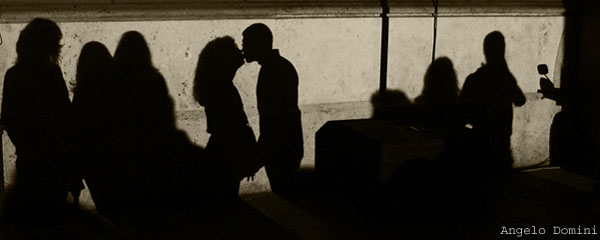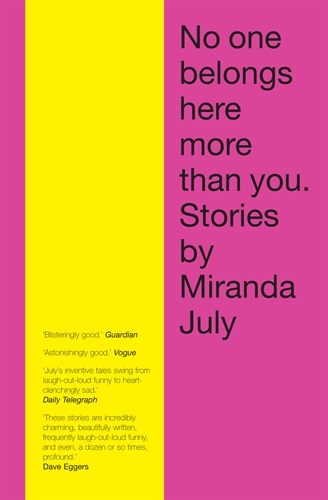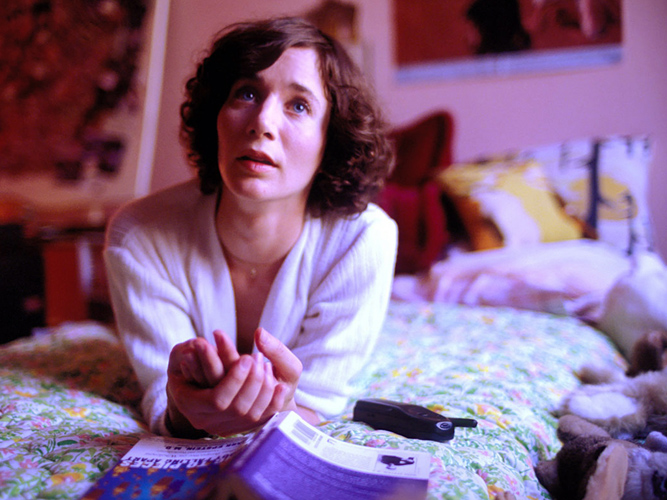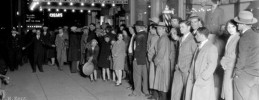
photo by Angelo Domini
In her essay, shortlisted for the 2013 THRESHOLDS International Short Story Feature Writing Competition, Anna Arbiter recommends No One Belongs Here More Than You by Miranda July.
*
Comments from the judging panel:
‘A subtle and nuanced reading of a (post) postmodern short story writer’; ‘a strong essay, giving a very good summary and a real taste of Miranda July’s stories’; ‘like July herself, she connects with the contemporary and reflects on the power of modern short story to speak to 21st-century readers’; ‘she gives us fresh insights into the longings the stories encapsulate’.
*
by Anna Arbiter
I encountered Miranda July first as ‘Christine Jesperson’. Christine lived alone and drove a cab for a firm that specialised in providing transport for old people. Those old people were her only friends. Christine dreamed of being a part of something, of truly belonging, of being loved by another person or by thousands, and in her spare time she made strange video art that documented these dreams. Then, in a single moment, she fell deeply and mutually in love with a man to whom she had never spoken. But was it really love or just a fantasy?
***
Christine Jesperson was the character July played in the award-winning film Me, You and Everyone We Know, which she also wrote and directed. Set in dingy suburban America, it follows a cast of loosely connected characters down paths of love, longing and lost innocence. The action is episodic and the characters, varied. It’s easy to see how July’s film-making style might translate into the art of short fiction. In No One Belongs Here More Than You, her only full length collection of stories to date, one finds, in turn, that her fiction retains a cinematic quality; her stories are visually rich, her dialogue is skilfully edited, and her ability to conjure up the reality of a scene is almost incantatory.
 July’s approach might best be described in relation to those short storytellers commonly referred to as postmodern, in particular Donald Barthelme and, more recently, George Saunders. Like them, she engages ironically with her subject matter, seeking to expose the surreal and sometimes nightmarish aspects of contemporary American culture. Equally though, the emotional candour of her work, as well as its emphasis on romantic love and female sexuality, make her a natural heir to the likes of Lorrie Moore and Amy Hempel, two of the foremost short fiction writers of recent decades.
July’s approach might best be described in relation to those short storytellers commonly referred to as postmodern, in particular Donald Barthelme and, more recently, George Saunders. Like them, she engages ironically with her subject matter, seeking to expose the surreal and sometimes nightmarish aspects of contemporary American culture. Equally though, the emotional candour of her work, as well as its emphasis on romantic love and female sexuality, make her a natural heir to the likes of Lorrie Moore and Amy Hempel, two of the foremost short fiction writers of recent decades.
Like July’s film, No One Belongs Here More Than You is a work that explores the desire to be loved and accepted; to be a part of something beyond the lonely confines of the self. It’s a desire that colours the experience of almost all the protagonists in the collection: the woman clinging to her bond with someone else’s daughter (‘How to Tell Stories to Children’); the woman attempting a life in a cockroach-infested apartment with her unrequited childhood sweetheart (‘Something That Needs Nothing’); another who imagines herself as the object of Prince William’s infatuation (‘Majesty’).
Yet nowhere is the desire to belong fulfilled, except fleetingly. The collection is a catalogue of human connections dreamed of but never established, or else all too quickly lost. And, like July’s on-screen persona Christine, when these characters do succeed in forging meaningful relationships, these moments are so abrupt and so glittering that they seem to hover on the brink of unreality.
In ‘Ten True Things’, the narrator befriends her boss’s wife, Ellen, and quickly invites the woman to her apartment. In preparation for the visit, the narrator walks around her home, trying to see it through Ellen’s eyes. ‘I do this before I bring someone new into my life,’ she tells the reader. ‘I try to get a sense of who I am so that I can make it easier for them to know me’. Hoping to reflect a nuanced identity that she imagines will appeal to her new friend, the narrator dusts her television and artfully messes up the papers on her desk. When Ellen comes by, her reaction is precisely the desired one: ‘When she saw my messy desk, she said she was the same way, and there was no dust on the TV, and I was easy to love.’ This sentence is the cliff-edge of the story, where suddenly the reader is unable to distinguish between Ellen’s speech and the narrator’s thoughts. From this point on, our belief in the unfolding events continuously wavers, and as the tale grows stranger and gathers pace, the possible gap between truth and desire only widens.
This hallucinatory sense of longing is encapsulated in the short story ‘This Person’. An unidentified individual prepares to attend some impossible and intangible event held in a park somewhere, ‘where every person this person has ever known is waiting to hug this person and bring her into the fold of life’. Just as Ellen serves as a mirror for the narrator’s longings in ‘Ten True Things’, so the ‘jerks and idiots and assholes’ from this person’s past come to reflect what this person most wants to see: ‘it is as if they have had plastic surgery, their faces are disfigured with love.’ And, in spite of the impossibility of the narrative, the narrator assures us that her dreams are finally coming true: ‘believing is not an issue here, the time for faith and fantasy is over, it is really really happening.’
July’s book is like a deep and wistful sigh. Reading it feels like reading a volume of poems; it’s raw and confessional and rarely seems to stray from the author’s own fears and obsessions. July’s presence is palpable throughout the collection, partly because  so many of the stories are narrated by female protagonists, who share certain traits with one another. Although these characters are vivid and intriguing in their own right, they also seem to represent different aspects of their author’s complex inner life.
so many of the stories are narrated by female protagonists, who share certain traits with one another. Although these characters are vivid and intriguing in their own right, they also seem to represent different aspects of their author’s complex inner life.
In ‘The Shared Patio’, July suggests an intense personal investment in her work. Here, the narrator contributes to an advice column in a magazine called Positive (written for people diagnosed with the HIV virus). For someone who is angry, the narrator advises: ‘Take an old pillow and lay it on the front lawn. Stab it with a big pointy knife. Again and again and again.’
However, the advice is supposed to be upbeat and encouraging, and thus the narrator’s efforts are rejected by the editor – they are too vibrantly coloured by her own loneliness and frustration. The problem stems from her failure to eliminate herself from her writing: ‘Common sense and the truth,’ she decides, ‘should feel authorless’. Unlike Positive, July’s stories don’t offer simple solutions from an infallible source. They are narratives shot through with authentic emotion, heartfelt accounts of the trials that come with living a life.
July’s writing is compelling in its honesty. She dwells fearlessly on the most pathetic and shameful of moments, articulating thoughts and feelings that might otherwise remain buried parts of human experience. Although her characters present themselves as outsiders – freakishly isolated and unlovable – they come to represent something universal, a loneliness that lives inside all of us. Looking closely at Ellen in the dim light of her apartment, the narrator of ‘Ten True Things’ sees her for the first time as a real person, an individual with her own private pain and struggle. ‘She lived on the earth like me’, the narrator realises, ‘she suffered as I did’. And this is how July’s collection consoles us. Not with upbeat advice and encouragement, but by acknowledging our common plight as human beings. In this way, it offers us somewhere to belong.
When I first read the title, No One Belongs Here More Than You, it sounded laudatory and effusive, part of a fantasy of unconditional love and acceptance. But, when I finished the book, closed it, and ran my eyes back over the cover, the message seemed like an honest one. The emphasis of the words had shifted. It no longer whispered to me seductively, telling me that I belong here more than other people do. Instead it reminded me that I am no less entitled than they are. My place on this planet is as certain and as uncertain as anyone else’s.
~
Photograph of Miranda July by Phoebe Sudrow
– as Christine Jesperson in the film Me and You and Everyone We Know.

